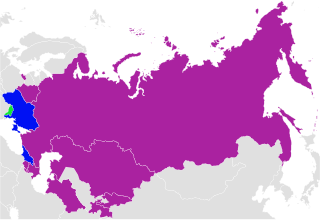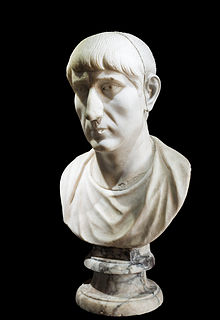
The 4th century was the time period which lasted from 301 to 400. In the West, the early part of the century was shaped by Constantine the Great, who became the first Roman emperor to adopt Christianity. Gaining sole reign of the empire, he is also noted for re-establishing a single imperial capital, choosing the site of ancient Byzantium in 330 to build the city soon called Nova Roma ; it was later renamed Constantinople in his honor.

The Donation of Constantine is a forged Roman imperial decree by which the 4th-century emperor Constantine the Great supposedly transferred authority over Rome and the western part of the Roman Empire to the Pope. Composed probably in the 8th century, it was used, especially in the 13th century, in support of claims of political authority by the papacy. Lorenzo Valla, an Italian Catholic priest and Renaissance humanist, is credited with first exposing the forgery with solid philological arguments in 1439–1440, although the document's authenticity had been repeatedly contested since 1001.

The Codex Theodosianus was a compilation of the laws of the Roman Empire under the Christian emperors since 312. A commission was established by Emperor Theodosius II and his co-emperor Valentinian III on 26 March 429 and the compilation was published by a constitution of 15 February 438. It went into force in the eastern and western parts of the empire on 1 January 439. The original text of the codex is also found in the Breviary of Alaric, promulgated on 2 February 506.

The Church of the Holy Apostles, also known as the Imperial Polyándreion, was a Greek Eastern Orthodox church in Constantinople, capital of the Eastern Roman Empire. The first structure dates to the 4th century, though future emperors would add to and improve on the space. It was second in size and importance only to the Hagia Sophia among the great churches of the capital. When Constantinople fell to the Ottomans in 1453, the Holy Apostles briefly became the seat of the Ecumenical Patriarch of the Greek Orthodox Church. Three years later the edifice, which was in a dilapidated state, was abandoned by the Patriarch, and in 1461 it was demolished by the Ottomans to make way for the Fatih Mosque.
The Free Access to Law Movement (FALM) is the international movement and organization devoted to providing free online access to legal information such as case law, legislation, treaties, law reform proposals and legal scholarship. The movement began in 1992 with the creation of the Legal Information Institute (LII) by Thomas R. Bruce and Peter W. Martin at Cornell Law School. Some later FALM projects incorporate Legal Information Institute or LII in their names, usually prefixed by a national or regional identifier.

Byzantine law was essentially a continuation of Roman law with increased Christian influence. Most sources define Byzantine law as the Roman legal traditions starting after the reign of Justinian I in the 6th century and ending with the Fall of Constantinople in the 15th century.

Simo Kaarlo Antero Parpola is a Finnish Assyriologist specializing in the Neo-Assyrian Empire and Professor emeritus of Assyriology at the University of Helsinki.
The Constantinian dynasty is an informal name for the ruling family of the Roman Empire from Constantius Chlorus to the death of Julian in 363. It is named after its most famous member, Constantine the Great who became the sole ruler of the empire in 324. The dynasty is also called Neo-Flavian because every Constantinian emperor bore the name Flavius, similarly to the rulers of the first Flavian dynasty in the 1st century.
Legislation.gov.uk, formerly the UK Statute Law Database, is the official web-accessible database of the statute law of the United Kingdom, hosted by The National Archives. It contains all primary legislation in force as of 1991, and all primary and secondary legislation since that date; it does not include legislation which was fully repealed prior to 1991. The contents have been revised to reflect legislative changes up to 2002, with material that has been amended since 2002 noted in a table but not yet fully updated.

The Eurasian Patent Convention (EAPC) is an international patent law treaty instituting both the Eurasian Patent Organization (EAPO) and the legal system pursuant to which Eurasian patents are granted. It was signed on 9 September 1994 in Moscow, Russia, and entered into force on 12 August 1995.

Simon Corcoran is a British ancient historian and lecturer in ancient history within the School of History, Classics and Archaeology, Newcastle University.
Computer-assisted legal research (CALR) or computer-based legal research is a mode of legal research that uses databases of court opinions, statutes, court documents, and secondary material. Electronic databases make large bodies of case law easily available. Databases also have additional benefits, such as Boolean searches, evaluating case authority, organizing cases by topic, and providing links to cited material. Databases are available through paid subscription or for free.
Sopater of Apamea, was a distinguished sophist and Neoplatonist philosopher.
The Law of Jersey has been influenced by several different legal traditions, in particular Norman customary law, English common law and modern French civil law. The Bailiwick of Jersey is a separate jurisdiction from that of the United Kingdom, and is also distinct from that of the other Channel Islands such as Guernsey, although they do share some historical developments. Jersey's legal system is 'mixed' or 'pluralistic', and sources of law are in French and English languages, although since the 1950s the main working language of the legal system is English.
The Iraqi Legal Database (ILD) is the first comprehensive and electronic legal database to be created in the Arab region. The project to create the ILD was launched in 2004 by the United Nations Development Programme (UNDP), through its Programme on Governance in the Arab Region (POGAR), and is being implemented in coordination with the Higher Judicial Council.
Richard William Benet Salway is a senior lecturer in ancient history at University College London. His areas of speciality include Greek and Roman epigraphy and onomastics, Roman law, Roman Imperial history and travel and geography in the Graeco-Roman world.

Constantine I's (272–337) relationship with the four Bishops of Rome during his reign is an important component of the history of the Papacy, and more generally the history of the Catholic Church.
The persecution of pagans in the late Roman Empire began late during the reign of Constantine the Great, when he ordered the pillaging and the tearing down of some temples. The first anti-pagan laws by the Christian state started with Constantine's son Constantius II, who was an opponent of paganism; he ordered the closing of all pagan temples, forbade pagan sacrifices under pain of death, and removed the traditional Altar of Victory from the Senate. Under his reign ordinary Christians began to vandalise pagan temples, tombs and monuments. This persecution had proceeded after a period of persecution of Christians in the Empire.
The legal history of the Catholic Church is the history of the oldest continuously functioning legal system in the West, much later than Roman law but predating the evolution of modern European civil law traditions. The history of Latin canon law can be divided into four periods: the jus antiquum, the jus novum, the jus novissimum and the Code of Canon Law. In relation to the Code, history can be divided into the jus vetus and the jus novum. Eastern canon law developed separately.









